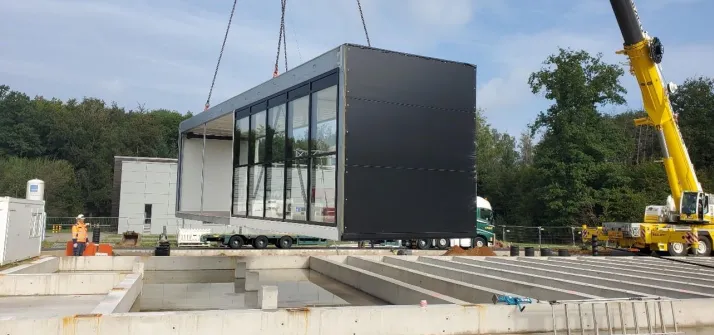What was the initial challenge for Eviden in building Europe’s first exascale supercomputer, JUPITER?
When Eviden won the tender to build Europe’s first exascale computer at Forschungszentrum Jülich (JSC) and its data center, the challenge was immense, a task few would dare to take on. The task was to connect 24,000 GPUs across 125 racks with 36,000 high-performance cables, power a system that consumes 17MW at full scale, and do it all in just a few months without a data center already in place. The starting landscape at JSC was only a concrete plinth.
What was so unique about the manufacturing process of JUPITER supercomputer?
Eviden’s modular data center (MDC) team and HPC systems experts worked hand in hand to design, ship, and install a custom-built infrastructure capable of housing the supercomputer. Unlike generic containerized solutions, Eviden’s MDCs were tailored to the customer’s requirements and designed to function like a permanent data center.
At Eviden’s Angers factory in France, compute modules were pre-assembled. Each module held 10 racks and nearly 2,000 GPUs. Power, cooling, and networking were tested before shipment. Starting in January 2025, a new pair of “bimodules” was delivered every two weeks.
Once on-site, they were craned into place, equipped with transformers and cooling towers, and connected through a central corridor that distributed power and network cabling. This modular approach allowed the entire system to be brought online just three weeks after the final delivery in May 2025, achieving a 9-month delivery for the Modular Data Center and a 15-month delivery for the entire system.
With the JUPITER supercomputer being so large, what technical issues did you face during the stabilization and benchmarking phases?
Teams worked around the clock—hardware engineers in the morning, stabilization crews in the afternoon, and benchmarkers overnight. Challenges inevitably surfaced. At around 300 petaflops, performance unexpectedly plateaued. With support from NVIDIA experts, the issue was traced to adaptive routing. The problem was resolved within days, and performance soared.
Thanks to meticulous planning, close collaboration, and relentless execution, Eviden helped JSC to go from “no data center” to the world’s 4th fastest computer in just a matter of weeks and the world’s most energy efficient system (JEDI partition) —setting a new milestone for European HPC.


